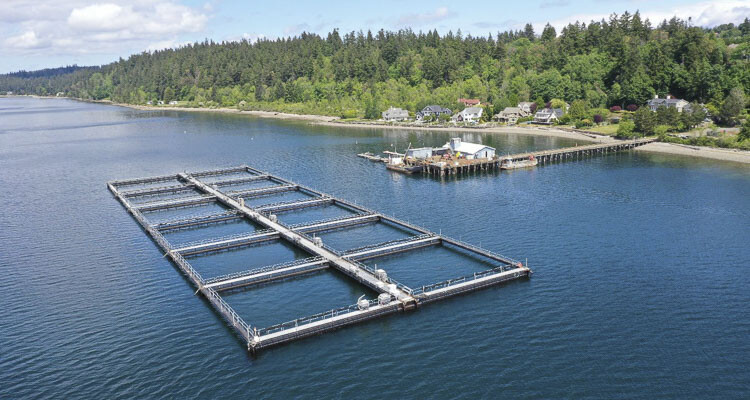
Todd Myers of the Washington Policy Center explains how repeatedly ignoring scientific assessments has a corrosive effect on the role science plays in decision-making
Todd Myers
Washington Policy Center
What use are government scientific studies? Not much, apparently, since many politicians who claim to follow “the science” glibly ignore research they don’t like.
Two recent examples stand out.

First is the decision by Commissioner of Public Lands Hillary Franz to cancel leases for net pens by Cooke Aquaculture and the Jamestown S’Klallam Tribe to raise steelhead and black cod.
In the announcement to ban net pens in Puget Sound, Commissioner Franz claimed, “there is no way to safely farm finfish in open sea net pens without jeopardizing our struggling native salmon.” Neither the statement nor the order offered scientific evidence to back up that claim. The only indication of the role of a scientific assessment was the claim that “not all risk can be eliminated” from net pen aquaculture. The order cited the Department of Ecology’s guidance document on managing net pen aquaculture, for this claim. However, that document does not take a position on net pens, but simply provides advice on how to manage the risks from aquaculture.
NOAA Fisheries, on the other hand, completed a scientific analysis of the risks from net pens. They concluded that the risk to Chinook, steelhead, and other species was “indiscernible” and that net pen aquaculture “does not increase the risk to the affected populations to a level that would reduce appreciably the likelihood for survival or recovery of” those species. That assessment is not referenced or contradicted by Commissioner Franz’s order. It is simply ignored.
The zero-risk standard that is at the heart of the decision is nonsensical. All actions have risk and risk and not acting creates its own risks. The order indicates that land-based aquaculture would be acceptable, but that requires more energy and cost, which creates its own negative consequences and risks.
Indeed, the zero-risk standard is at odds with the Land Commissioner’s decision, in the same order, to support tribal hatcheries. Hatcheries are an important part of maintaining and restoring salmon populations, but all hatchery managers know there are risks associated with hatchery production.
The same glib dismissal of science is also apparent regarding the Snake River dams. In the largest study on the impact of the dams, the U.S. Army Corps of Engineers, along with input from other agencies, including NOAA Fisheries, determined that keeping the dams in place provided the best combination of benefits, including salmon recovery.
The report notes the improvements in salmon returns for keeping the dams “could make a meaningful contribution to meeting these [salmon recovery] goals while the region works together on additional actions to help achieve long-term salmon recovery and economic sustainability.” The report goes on to note, “the overall abundance of Chinook salmon available to Southern Resident killer whales for prey, numbers of adults from the Snake River Basin (including both hatchery and wild produced fish) are now greater than they were in the 1960s, before three of the four lower Snake River dams were built.”
Despite that, anti-dam activists and the Inslee Administration continue to claim destroying the dams is the only option and that the dams are harming prey availability for the Southern Resident killer whales.
The Biden Administration even went so far as to create a report claiming the dams should be destroyed in an effort to undermine the scientific evidence to the contrary. Ironically, that report admits their analysis isn’t scientific. The report specifically says it is not a scientific assessment and does not supersede previous scientific analyses. And yet, it is cited as justifying destruction of the dams.

Perhaps the most egregious demonstration of how little science means to politicians is the report on the Snake River dams from the governor and Senator Murray. That report cited a study on salmon returns in the initial draft, only to dismiss it in the final report after the authors realized it contradicted their arguments.
In the original draft, the report cited a study by Welch et al. to claim that the Snake River has some of the worst salmon return ratios across the West. In fact, the study says the opposite. When this was pointed out, instead of changing their conclusion, they simply changed the citation to the unscientific Biden Administration report, ignoring peer-reviewed science in favor of a political document.
Repeatedly ignoring scientific assessments has a corrosive effect on the role science plays in decision-making. It sends the signal to the public that when a politician says “science,” research is just a cover for a political agenda. Scientific research either needs to inform our decisions – even when it is inconvenient – or we should quit wasting time and money on reports that are ignored when they don’t serve political goals.
Todd Myers is the director of the Center for the Environment at the Washington Policy Center.
Also read:
- POLL: Why did voters reject all three tax proposals in the April 22 special election?Clark County voters rejected all three tax measures on the April 22 special election ballot, prompting questions about trust, affordability, and communication.
- Opinion: The war on parental rightsNancy Churchill argues that Olympia lawmakers are undermining voter-approved parental rights by rewriting key legislation and silencing dissent.
- Opinion: An Earth Day Lesson – Last year’s biggest environmental victories came from free marketsTodd Myers argues that Earth Day should highlight free-market solutions and grassroots innovation as more effective tools for environmental stewardship than top-down mandates.
- Opinion: Time to limit emergency clauses and give voters a choiceTodd Myers urges the governor to remove emergency clauses from bills that appear intended to block voter input rather than address real emergencies.
- Letter: C-TRAN Board improper meeting conductCamas resident Rick Vermeers criticizes the C-TRAN Board for misusing parliamentary procedure during a controversial vote on light rail.










